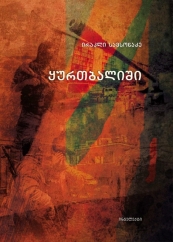THE CUSHION
‘Irakli Samsonadze is a writer who makes no concessions. Everything he writes is an artistic representation of a harsh reality and leaves a long-lasting impression on us. The Cushion concerns a people and a land suffering from the destruction of an empire. Its cruel realism is heartrending and melancholy. Every human experience in it is in focus, as if recalling a significant human experience of the recent past, and a detailed testimony of the flow of life. The Cushion is a creation out of chaos, it is the sadness of a society with both order and justice disintegrating. Irakli Samsonadze can definitely be considered one of the creators of Georgian neo-realism, because he has created honest and well-focussed texts about post-Soviet Georgia.’
E. Tskhadadze, literary critic / newspaper 24 Saati
‘Irakli Samsonadze, as a writer, sees things primarily with his heart and follows the dictates of his heart, which is why he portrays his characters with their heartfelt pain or relief. He feels pity for ‘hopeful helplessness,’ for people unable to act, who, despite their mistakes, their weakness and fallen state, are still looking up to the heavens.’
M. Jaliashvili, literary critic
EXTRACT
Tsanslated into English by Elizabeth Heighway
We wrapped our arms around each other. Family. Microcosm. Chaos in the microcosm. An earthquake. A torrent. Black death. The daily reality of destitution, so pitilessly piling upon people hopelessness upon hopelessness. Hopelessness makes you bitter. And one day hopelessness explodes like a mortar. It did explode. It blew apart. Into shrapnel, all over the flat. An acrid smell like gunpowder. As tortuous as a lie told by an honest child. As tortuous as the shame of destitution. Yes. Tortuous. Like shame. But Vakho still managed. Vakho’s managing to sound sober. ‘Come on,’ Vakho says, ‘both of you come.’ He listens. ‘Do you want me to beg?’ he asks. Then he says, ‘Listen, which one are you, Maia or Manana? Maia, do you want me to beg?’ Vakho hangs up. Vakho is drunk again. ‘Whores,’ says Vakho. ‘Five-dollar whores. Those bitches charge Turks five dollars but they make me beg. Five-dollar whores make me beg.’ Vakho is getting wound up. It’s what he does. It’s as if he can’t bring himself to care unless he’s wound up. Not that this was anything to care about anyway. Fat, blathering whores. Both exactly the same. Bottle blondes. Cheap scent. An unwashed smell like rancid butter. Blather. Pointless, incessant blather for its own sake. Psychic, or so they said. Yes. Psychic. The pair of them. They read coffee grounds, too, and their dead aunt appeared to both of them in a dream. Yes, they both tell fortunes. They’re religious too. They said so. Very religious. And patriotic. When the independence movement started they were right there, milling around among the dismantled tents in front of the Parliament. Neither lets the other get a word in, unless it’s to back up what they’re saying. ‘Isn’t that right, Maia?’ ‘Isn’t that right, Manana?’ ‘Yes, Maia!’ ‘Yes, Manana!’ And off she goes. Where has she gone? She’s hauling her fat arse in its little dress off towards the kitchen. But which one of them is it? I don’t know. What does it matter? They act so alike. Hey you, Maia! Hey you, Manana! They don’t know what a ‘European’ is. What’s a ‘European’? She must know, surely?! Laughter. I laugh. Why am I laughing? I don’t know. What does it matter? It means a blow job. Understand? Do you understand what it means now? Yes. Sure. Well, they don’t. Drunk. I’m drunk. Loud talking. Neither lets the other get a word in. They want to buy mobile phones. They’ve already got phones, but now they want new ones, the one that’s just come out. Sausage on the table. Bottle of vodka. Other things. Things. Their chatter. That unwashed smell like butter. Wanting to forget. Yes. To forget. No matter how or by what means. Just to forget. My hand on someone’s arse. Whose.The one on my right. She’s laughing. Why is she laughing? They didn’t come here for that, they just came to see Vakho. What does ‘for that’ mean? Laughter. As if he doesn’t know... (See PDF)
In case of using the information, please, indicate the source.
